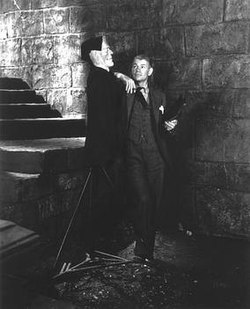He directed twenty-one movies; two of them are indisputably classics. (I haven’t seen Show Boat or Waterloo Bridge, and they don’t get talked about all that much.) He shaped a nation’s perception of Frankenstein’s monster; I wonder how much time will pass before we don’t see Boris Karloff with neck bolts. The conversation about him, however, is limited, and he mostly seems to be used as an example of how Hollywood destroyed those who wouldn’t stay in the closet, even though there seems to be debate about how much that’s really true.
A conversation we have less is that he almost didn’t have a chance to work in the arts at all. He was the sixth of seven children, and his potential earnings were more important to the family than his talent. He became a cobbler, because he wasn’t strong enough to go into heavy industries like the rest of his family, and sold crooked nails he’d straightened to save up for night classes. He was captured in World War I and ended up in a POW camp, where he helped put on morale-building shows. He played a lot of poker, and was good enough to finance art school after he got out with what he’d saved.
For every James Whale, how many people are there who never had the chance? If he’d been stronger, would he have been able to work as a blast furnaceman like his father? Would that have meant not having the opportunity to take night classes, not being able to save up the small amount necessary? What if he’d been lousy at poker, or just shot outright instead of taken prisoner? There are a lot of possibilities that would have meant someone else working at Universal when he did; I assume there eventually would have been Frankenstein, and given the way Universal works, we probably would’ve had Bride. But would they have been as iconic?
Not everyone with talent can be famous, of course; talent is too common for that. It’s just always depressing to me to think about the people who never had anything but the life they were expected to lead, lives of not even quiet desperation because they don’t realize there’s anything but that life. James Whale knew he could do something else, and he was able to fight for it. We’re enriched for that. But a generation before, would he have known that there was another way? In this generation, would he have ever been able to save up enough?
The argument about whether or not his films have queer subtext is never going to end. What I think is indisputable is that they have a sense of the outsider, and I think that’s as much about class as it is about anything else. About being an immigrant, too. James Whale had been an outsider in one way or another for much of his life. I still believe, though, that the worst of it must have been when he could feel his brain falling apart, and indeed that’s what ended up driving him to suicide. I can’t say as I blame him.
I don’t have selling crooked nails; I have Patreon!

